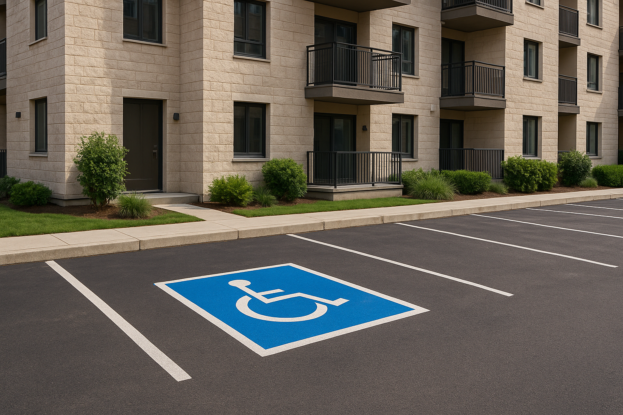A recent court ruling clarified that municipal planning authorities cannot retroactively revoke the allocation of accessible parking in Israel to a specific apartment unless clear conditions were set in advance. The court ruled in favor of a developer who had already assigned and sold an accessible parking space, stating that the planning authority’s objection came too late. The case highlights important legal guidelines for when and how accessible parking in Israel can be designated as shared property or privately allocated.
By Adv. Ayelet Tzur with the assistance of intern Dor Ben-attia
Case Background:
Accessible parking in Israel refers to parking spaces specifically designed for people with disabilities—both in terms of their size and location, typically near the entrance to a residential building. Regulations require that new buildings include a certain number of accessible parking spaces, in addition to the standard parking quota. In Rishon LeZion, the common practice has been that if an accessible parking space isn’t purchased by someone with a disability, the developer is allowed to sell it to another buyer and register it as linked to their apartment.
In this case, the real estate company Citrine Projects and Investments Ltd. received a building permit for a residential project in Rishon LeZion in 2021. After construction was completed, the company submitted the building plan for approval, which included the assignment of an accessible parking space to one of the apartments that had already been sold. However, the Rishon LeZion Municipal Licensing Authority rejected the request, stating that the space must remain part of the shared property for the benefit of all residents.
Legal Argument:
The company, represented by Adv. Michael Shnitkin, argued that the Licensing Authority’s decision lacked legal authority, contradicted established practices, and infringed on the company’s property rights and legitimate expectations. They further claimed that no law or regulation in Israel requires accessible parking to remain part of the shared property, and that any shift in policy was introduced without proper procedure and in a manner that unfairly disadvantaged the company.
In response, the Licensing Authority and the Local Planning Committee argued that accessible parking in Israel is intended to serve the public, particularly individuals with disabilities, for the entire lifespan of the building. Allocating such a space to a single apartment, they claimed, undermines the purpose of the regulations and could limit future access for residents with disabilities. They also contended that this kind of allocation gives one resident an unfair economic advantage at the expense of the wider community.
Given the broader implications of the case, the court added the Israel Planning Administration (IPA) as a respondent and approved the participation of several key stakeholders, including the Israel Builders Association, the Federation of Local Authorities in Israel (FLAI), and the Foundation for the Promotion and Development of the Construction Industry

Court Decision:
The court divided its ruling into two parts. At the general level, it held that there is no legal obstacle to classifying accessible parking in Israel as shared property. It further ruled that municipal planning authorities are within their legal rights to require such parking to remain part of the shared property during the permitting process or when issuing a final occupancy certificate (Tofes 4).
However, the court established specific conditions for when and how this authority can be exercised:
- It applies only to accessible parking spaces that exceed the standard parking quota.
- The developer must have been notified—either within the permit information file or through another effective means—that the space cannot be allocated to a private apartment.
- This requirement must be explicitly stated in the building permit or recorded as a condition in the Israel Land Registry (Tabu).
In this case, the court found that at no stage during the planning or construction process were any instructions or restrictions issued regarding the allocation of the accessible parking space. The building permit contained no such conditions, and the post-construction request to update the property registry also made no reference to shared ownership. In fact, a municipal official had explicitly informed the company that assigning the space to a specific apartment was permitted. The Licensing Authority’s refusal came only after construction was completed and the space had already been sold. As a result, the court accepted the petition and annulled the decision of the Licensing Authority to revoke the accessible parking allocation.
It is important to note that an amendment to Israel’s Real Estate Law is currently underway. The proposed change would permit accessible parking in Israel to be allocated to individuals with disabilities—or their household members—and, in certain cases, to non-disabled individuals. This would be allowed only if no residents with disabilities currently live in the building and at least one accessible space remains in the shared property, ensuring flexibility for future residents with accessibility needs.
We thank Adv. Michael Shnitkin for his dedication and expertise in leading this case.
(Case: Admin. Appeal 56411-06-24 Citrine Projects and Investments Ltd. v. Rishon LeZion Local Committee et al.)
Gindi Caspi & Co. is one of Israel’s most prominent law firms in real estate, planning and zoning, and urban renewal. With decades of extensive experience handling complex and large-scale real estate transactions, the firm is consistently ranked among the top-tier firms in these fields by all major rating companies. Notably, the international LEGAL 500 recognized Gindi Caspi & Co. as a Leader in real estate, planning, and zoning and highlighted Adv. Ziv Caspi as a Leading Individual in Israeli law. The firm has also received numerous accolades, including ranking among the top real estate law firms (Dun’stars) in planning, zoning, and urban renewal. It was honored as a “pillar and cornerstone in fulfilling the nation’s vision for building and settling the land.” For five consecutive years, the firm has been ranked first in Israel in the field of urban renewal.
For inquiries, contact law@gindi-caspi.co.il.







